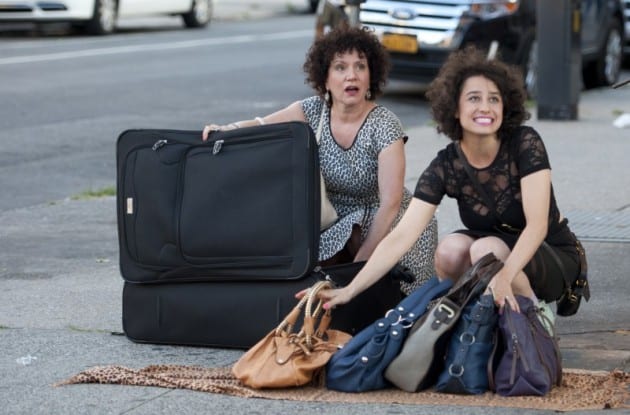
The fact that the script for “Knockoffs” even made it out of the writing room speaks to the confidence of Broad City; I don’t think there’s another show that could tell the story they did, nor be able to deliver it in such an effortless, careless fashion as Broad City does. And that’s just the main story of the episode; “Knockoffs” also delivers one of its best B stories when Ilana attends her mother’s shiva with her parents (played by Susie Essman and Bob Balaban), a beautiful introduction to the people who made Ilana the brash, wall-twerking spitfire she is today. An episode about dealing with jarring moments in life, “Knockoffs” is the perfect blend of Broad City‘s weekly formula (even though it lacks Bevers and Lincoln, respectively the worst and best of Broad City’s secondary cast).
What makes the episode so memorable isn’t Ilana’s story, obviously: Abbi and Jeremy’s long-awaited date makes for a hilarious, surprising examination of modern sexuality, as well as being a perfect capper to a story that’s been building for the show’s first 13 episodes. Everything about her date with him is a dream: he literally is, and does, everything she’s dreamed about (the next morning, he leaves to teach wood shop to underprivileged children, referring to a comment Abbi made last season). And like all dreams, they are meant to be shattered by reality, which happens when Abbi suggests switching positions – which Jeremy takes as an invitation to literally change positions, asking Abbi if she’d kindly peg him.
Now, it leads to one of Broad City‘s single greatest phone calls – but it also provides an interesting venue to bring Jeremy back down to earth, the one character the show’s been content to let rest on a pedestal throughout the series. That comes later, though: Abbi and Ilana’s phone call from Jeremy’s bathroom is a microcosm of everything that makes the central relationship of the show beautiful; Ilana, ever the person to have experiences, points out that her dead grandmother did everything she wanted to do in life, a rare occurrence for a human being (and a decidedly twisted way to express the tenants of carpe diem). She also points out that Abbi already knew exactly what she would say in this situation, giving voice to Abbi’s constant hesitation to break out of her shell and be the fun, expressive person (like Ilana) she’s always viewed herself to be. She’s a trainer, not a cleaner – and after a little push from her best friend, she goes off and pegs the guy she’s been dreaming of dating for months.
From there, the episode shifts to Ilana’s B-story, which would perfectly slide into first billing in most episodes, yet exists here as a way to both let Abbi’s story exist on its own and to build out Ilana’s back story a bit, introducing her Jewish family and their “curiosity,” something that isn’t necessarily stamped out by the death of a family matriarch. Ilana would say talking about Abbi’s evening is a way to honor her grandmother; given the reaction of other people at the shiva, one might say they’d actually agree.
Ilana’s story is certainly a little more absurd (though the image of Abbi arguing with Jeremy while wearing a knockoff strap-on is easily one of the show’s most absurd, and unforgettable), but it still works on the same human level as Abbi’s; as Ilana and her mother delve farther into the surreal underground trade of knockoff bags, the story reveals itself to be about her mother not being able to let go of someone she loved, clinging onto the knockoff bags with the notion that they would keep her grandmother’s memory alive. In short, the bags were Grandma knockoffs – and somehow, the episode neatly makes a parallel to the knockoff Abbi’s trying to peddle in Jeremy’s bedroom the next night, after melting his “adult toy” in the dishwasher (something the employee suggests is a regular occurrence, moments after we see Ilana’s co-worker trying to buy stronger nipple clamps).
As Jeremy (and Ilana’s mother) point out, there’s no replacement for the real thing; and what follows is a surprisingly measured view of human (and specifically, modern) sexuality, both from the bedroom of Jeremy’s apartment and the kitchen in the home of Ilana’s parents. The former is one of the shows funniest scenes ever; while Jeremy gets snooty about the brand of toy he and Abbi are using, the story shifts to become an examination of what can happen in a society that’s almost a little too comfortable with sexuality – as well as see Abbi briefly become the dominating, assuming male we hear about too often in real life; just because she got to do freaky things with Jeremy on the first night doesn’t mean she doesn’t have to respect his wishes as a human being, which is where their budding relationship slowly begins to fall apart. Jeremy’s not a bad guy, per se, but he does live in a world where if one has the financial means and predilections to do so, they can live exactly the life they want to live.
I could write a thousand words on Abbi’s conversation with Jeremy; I think the image of her standing, strapped up (is that the right phrase?) with her arms spread out in questioning bro style (“Whadda mean, bro?”), pointing out to Jeremy that no, she is not a leather smith (she thinks that leather is blown, not tanned), speaks volumes. And surprisingly, their argument leads to the most cathartic moment of the night; after Ilana helps her mother realize that she’s chasing the high of knockoff bags to replace the mother she’d lost, her mom goes home and receives the kind of spousal support Abbi and Jeremy are both looking for (in other words, her husband agrees to let her peg him, after a little bit of reluctance).
For Abbi and Jeremy, their exploration led them to truths they didn’t want to necessarily face about each other; for Ilana’s parents, it reinforced the trust and honesty that’s made their relationship such a lasting, healthy one (isn’t it refreshing to see an older couple who don’t spend their entire visit bickering? Such a nice change of pace from normal comedy of its type). And that little capper is really what seals the episode, the final step in bringing these two crazy, seemingly unrelated premises together for a meaningful ending; we only get one shot a life, so take the opportunities given to you. It’s a simple message, but one that Broad City embodies with its off-kilter, poignant, and endlessly empowering brand of progressive comedy, a literary style on full display in “Knockoffs,” 2015’s funniest half hour so far (and it’s not even close).
[Photo via Comedy Central]
 Follow Us
Follow Us





